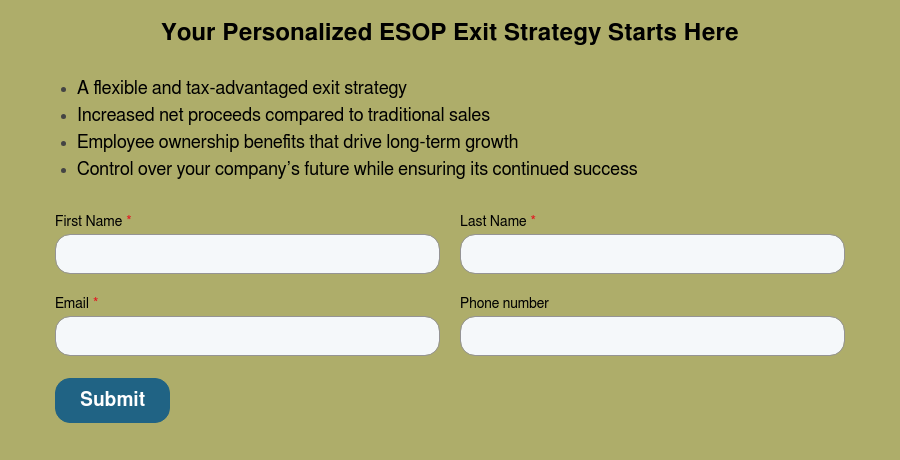Industry Trends
Largest Transactions Closed
- Target
- Buyer
- Value($mm)
Last updated:
Employee stock ownership plans (ESOPs) continue to gain recognition as a powerful tool for effective estate planning. ESOPs provide business owners with a unique opportunity to seamlessly transfer ownership and ensure the long-term viability of their company while reaping significant tax advantages. But like many business owners, you may be unaware of the full impact of ESOPs, including the incredible benefits this estate planning strategy can offer.
Read on to explore five potential advantages of ESOPs as an estate planning vehicle, so you can make informed decisions to secure your company’s future and protect your financial interests. Before moving forward, consider key questions to ask when exploring an ESOP to ensure the best strategy for your business.
Selling stock to an ESOP provides you, the selling shareholder, with an opportunity to convert illiquid ownership in the company into liquid assets. Further, selling stock to the ESOP allows you to diversify your estate’s assets, reducing the risk associated with tying up a significant portion of wealth in a single, illiquid investment.
When selling company stock to an ESOP, your company likely will assume additional leverage to facilitate the transaction. While senior bank financing is a popular choice, it isn’t the only option. The table below describes the various ways to achieve liquidity, which is crucial not only for effective estate planning but also for flexibility when it comes to realizing your intentions for the estate.
| Source | Description |
| Senior Lender Financing | Funds borrowed from a traditional bank (typically) are used to purchase the company stock from you the selling shareholder, providing immediate cash liquidity. Your company’s cash flows and assets may serve as collateral for the loan. |
| Excess Company Cash | You use any excess cash on your company balance sheet to finance the transaction. |
| Mezzanine Lender Financing | With this form of subordinated debt, funds are borrowed from a mezzanine lender and rank below senior debt in terms of repayment priority. These funds are then used to finance the ESOP transaction. |
| Seller Financing/Rollover Equity | Selling shareholders provide financing to the ESOP or to your company through seller notes; the company then provides promissory notes to you and as the company repays the note, you’ll receive cash over time. The subordinated nature of the seller note along with the associated risk, allows for discounting, which creates gifting opportunity. |
| Warrants | Often issued in conjunction with a seller note, this instrument entitles you to purchase shares of your company at a predetermined exercise price. Practically in an ESOP transaction, rather than being exercised, these instruments are purchased by the company at fair value and with discounts applied creates a gifting opportunity. |
| Sale of Non-Core Assets | Your company may choose to sell non-core assets to generate cash for the ESOP transaction. This can provide you with liquidity while your company continues to focus on core operations. |
By selling to the ESOP, you establish an internal market for your company’s shares, so employees attain ownership gradually over time. Understanding the differences between partial and 100% ESOP ownership can help business owners structure a transition that aligns with their long-term goals. The ESOP thus functions as a mechanism for identifying and nurturing future leaders within the company, allowing you to preserve the continuity and integrity of the business that you’ve worked so hard to build over the years. According to statistics published by the National Center for Employee Ownership, turnover in ESOPs between 2014 and 2017 was 10.8% versus 27.1% in non-ESOP companies. That’s because developing a pathway to ownership fosters a sense of loyalty and commitment among employees, incentivizing their long-term dedication to the company’s success.
Selling to an ESOP also ensures a structured succession plan within your company, facilitating a smooth transition of leadership when you decide to retire or in case you pass away unexpectedly. An ESOP serves as a ready buyer of the company, so a deceased shareholder’s heirs are not forced to sell their shares at a distressed price. Partial sales to the ESOP over time permit those heirs who would like to remain in the company to retain some portion of equity ownership, while those who prefer to remain outside the business receive their share in the form of cash.
Furthermore, the US Department of Labor requires that ESOP-owned companies undergo an annual third-party appraisal to determine their market value; the objective and professional nature of this assessment can settle any disagreements among the estate or its heirs around value. And an ESOP’s established equity price makes it far less likely that the Internal Revenue Service will attempt to have its own independent appraiser assign a value to your company—a process that can lead to unforeseen estate taxes.
While estate planning and the sale of your company certainly require a focus on dollars and cents, selling stock to an ESOP also offers a somewhat less tangible benefit: a way to preserve your legacy. Unlike selling the company to an external buyer, which may lead to changes in your company’s culture or strategic direction, selling to an ESOP means you can uphold your company’s values and vision. Learn how ESOPs inspire a strong culture of ownership and enhance employee commitment. This is particularly significant if you are a family-owned business, which often comes with a deep emotional attachment to your company’s heritage. An ESOP can ensure that your legacy lives on, benefiting future generations who may be involved in the company.
In addition, selling stock to an ESOP can create a charitable legacy within the company, in the form of the benefits that your employees receive—at no cost to them. As the company performs, an ESOP has the power to provide significant wealth gains for the employees that would otherwise not be achievable without the ESOP. This perpetuates your commitment to social responsibility and community engagement, all while enhancing the company’s reputation and leaving a lasting, positive impact.
In an ESOP transaction, the shareholder sells stock to the plan as opposed to a third-party buyer, who would likely want to buy assets. Selling a portion or all of your company’s stock to an ESOP can therefore facilitate tax-efficient wealth transfer: when you pay capital gains taxes on the proceeds, rather than a blended rate of capital gains taxes and ordinary income taxes, your average savings can reach upwards of 10%.
Additionally, selling to an ESOP presents you with significant tax advantages under Section 1042 of the Internal Revenue Code. Explore key ESOP tax incentives for selling shareholders to maximize savings and financial returns. In many situations, you may be able to defer all taxes in the sale of shares to the ESOP. For example, if you transfer the basis in your closely held company to qualified replacement property (QRP), you can defer any tax on the sale’s proceeds—or often avoid it altogether. If you pass the QRP through to your estate, your heirs will inherit these securities at a stepped-up basis and can avoid taxes altogether from selling the company to the ESOP. The upshot: by deferring capital gains tax, you can preserve a larger portion of your estate’s value.
Many closely held businesses are capitalized primarily by equity and carry very little long-term debt on their books, which means they are well suited to using an ESOP structure as a gifting plan. Your company’s post-transaction balance sheet likely will display a significantly different capital structure from its pre-transaction structure. The additional debt provided for the estate’s liquidity depresses the equity value of the company, making the sale of your company’s stock to an ESOP an immediate, advantageous tool for gifting retained shares to future generations.
Due to federal limitations on the amount and value of shares that an individual can gift tax-free to future generations each year, many business owners gift minority stakes in their closely held business to their heirs annually. The value of these sales can be further depressed with discounts applied to minority positions. Applying reasonable assumptions about the amount of debt your company would incur as part of an ESOP transaction and about the discounts that should be applied to a minority stake, you may be able to gift at a value that is substantially below the stock’s initial, pre-ESOP market value.
Selling stock to an ESOP also creates opportunities for charitable giving within the estate planning process. After the ESOP acquires the shares, you can donate a portion of the proceeds to charitable organizations, either during your lifetime or through a testamentary bequest. By selling stock to the ESOP and subsequently donating some of the proceeds to charities, you may become eligible (based on the size of the donations) for income tax deductions. These deductions can further reduce your tax liability, potentially providing significant tax savings.
And if that’s not enough incentive for you, remember that selling stock to an ESOP allows you to support charitable causes aligned with your values and interests. Selecting philanthropies that have a meaningful impact is another way to leave a lasting legacy, not only benefiting the charitable organizations but also contributing to your personal fulfillment and sense of purpose.
***
Creating an ESOP offers a host of advantages as an estate planning tool for you, your company, and your employees, from facilitating a smooth ownership transition to optimizing liquidity and tax efficiencies to preserving your legacy and more. For business owners who understand how to reap the ancillary benefits, ESOPs are an undeniably useful tool that can open up a world of opportunities—today, tomorrow, and well into the future.
Selling your business is a major decision—why not choose a strategy that maximizes your proceeds, minimizes taxes, and secures your legacy?
Fill out the form below to contact our expert ESOP advisors today. Let’s discuss if an ESOP is right for you.

Investment Banking | ESOP
Chicago Office
847-239-2466 (direct)
ezaleski@pcecompanies.com
Connect
847-239-2466 (direct)
407-621-2199 (fax)
